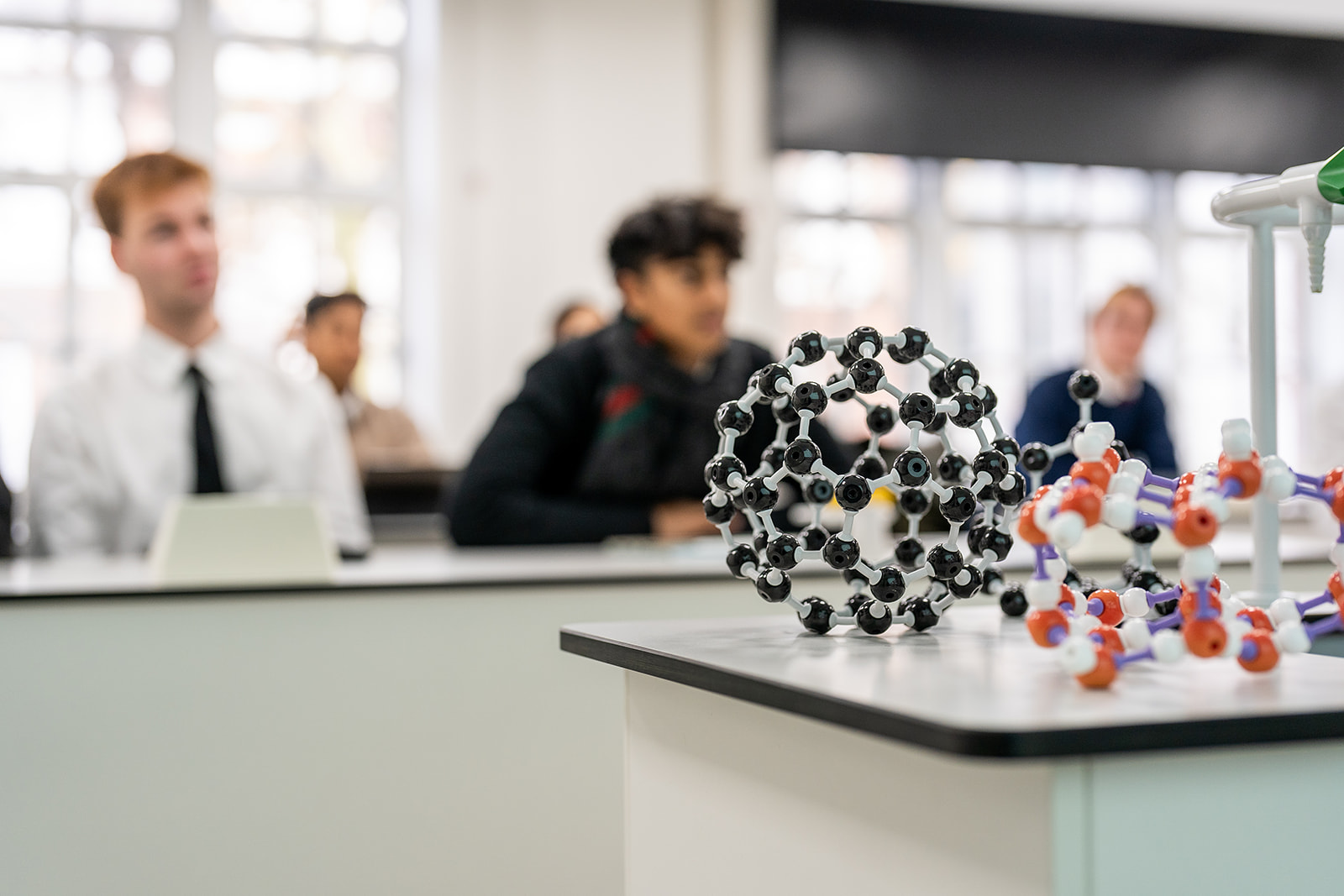Lower School Chemistry is about developing the foundation of skills necessary to tackle the subject at a higher level. Much of the Fifth Form (Year 9) focuses on writing formulae and balanced equations, and understanding the fundamental concepts of bonding. Thereafter, in the Lower and Upper Shells (Years 10 and 11), the emphasis shifts onto organic chemistry, physical chemistry and applying these skills to understand some important industrial processes.
About
Curriculum
Enrichment
Staff
After Westminster
-
About
The principles of Chemistry underpin our understanding of the world around us and are relevant to all areas of science, from the chemical processes in living organisms to the formation of stars millions of miles away. The core concepts introduced in Chemistry form an important part of any professional scientist’s toolkit, regardless of their specialisation. Pupils at Westminster study Chemistry for a variety of reasons: many study it in conjunction with other Sciences and Mathematics, and go on to study Science at university; many hope to study Medicine at university; and a handful study Chemistry on its own because they simply enjoy it.
The subject has exploration at its core and practical investigation is central to its practice. Development of skills is important, but so too is an inquisitive mind and the ability to problem-solve. Chemists draw on an array of disparate concepts to try to explain fundamentally why it is that things happen.
-
Curriculum
Lower School
Syllabus & CodeEdexcel IGCSE 4CH1 ChemistryUpper School
Chemistry beyond GCSE is conceptually challenging and requires good factual knowledge. While the need for the memorisation of facts remains important, much greater emphasis is placed on the understanding of the principles underlying the material and in relating this to laboratory experience. Indeed, considerable time is devoted to practical work and the department has four large, well-equipped teaching laboratories as well as a research laboratory.
In the Sixth Form and Remove (Years 12 and 13), we use the CIE International A Level as a guide to teaching, but much of what is done in class goes beyond this and tries to develop a problem-solving toolkit for tackling ideas in unfamiliar contexts, including the challenge that comes in the form of a practical exam.
Syllabus & CodeCAIE A Level 9701 ChemistryEnrichment
There are many opportunities to study Chemistry outside the timetable, for example via the Options programme or by participating in the Chemistry Olympiad, where Westminster has in the past ranked as the top school in the country. Every year, the Sixth Form is invited to take part in the Cambridge Chemistry Challenge, and a handful of pupils in each of the recent years have ranked in the top 1% nationally.
The Huxley Society (Westminster’s science society) gives pupils in all year groups the opportunity to attend, and host, talks on the whole range of sciences and technology. This helps to develop cross-curricular interests, which some then expand on for research competitions such as the UK Junior Water Prize – a national STEM competition aimed at solving environmental challenges with a link to water.
In the Election Term (summer) all Sixth Form Chemists take on an independent research project, aimed at developing practical skills outside of the syllabus. In recent years, pupils have synthesised aspirin, paracetamol and a range of complex organometallic and transition metal compounds.
Staff
* denotes Head of Department
Mr Paul Botton (PAB)
† denotes Housemaster
Mr Matthew Bradshaw (MRB) †
Mr Jack Chapman (JPC) — Head of UCAS; Head of Chemistry *
Mr Ed Coward (ETAC) — Director of Teaching and Learning
Mr Arthur Dabrowski (ARD) — Director of Lower School
Mr Dewi Eburne (EDE) — UCAS Advisor, Acting Head of Lower Shell
Miss Gilly French (GMF) — Review Coordinator
Ms Rino Iida (RI)
After Westminster
Chemistry graduates possess adaptability and an analytical mind, which makes them attractive to a very broad spectrum of employers. For the study of Chemistry at university, it should ideally be combined at A Level with Mathematics (an additional Science is also desirable). About one in three Chemistry graduates will continue with their academic studies and aim for higher degrees such as a PhD or DPhil.
Many Westminster A-level Chemists go on to pursue courses in Natural Sciences, Biochemistry and, of course, Chemistry, at a variety of top Russell Group universities.
 "I just love organic chemistry - I find it really fascinating and challenging at the same time"
"I just love organic chemistry - I find it really fascinating and challenging at the same time"— David, Y11 pupil
